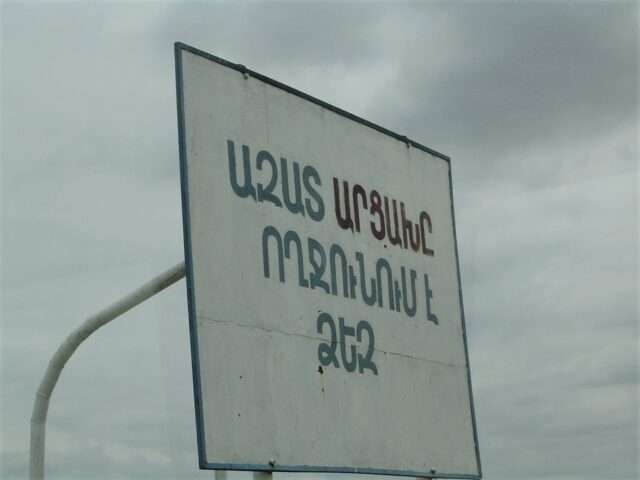Nagorno-Karabakh/Artsakh: Azerbaijan’s strategy might lead to a humanitarian crisis and a military escalation

Kavkaz Files ISSN 2975-0474 Volume 14 Issue 2
Authors: Silvia Boltuc & Giuliano Bifolchi
Azerbaijan’s transport and gas supply blockade of the Nagorno-Karabakh/Artsakh might cause a regional humanitarian crisis and evolve into a military escalation capable of destabilising the South Caucasus.
On December 12th, 2022, Azerbaijan’s environmental activists blocked the Goris-Stepanakert highway, cutting off the Republic of Artsakh and its 120 000 inhabitants from the outside world. On December 13th, 2022, Azerbaijani authorities stopped supplying gas to the Republic of Nagorno-Karabakh/Artsakh.
Stepanakert’s authorities consider Azerbaijani actions a violation of the obligations assumed by the trilateral statement of November 9th, 2020. The Nagorno-Karabakh Government accused Azerbaijan of perpetrating a State-organised humanitarian crisis and a terrorist action against local civilians.
The Azerbaijani blockade has cut off food, medicine, and energy supplies for about 120 thousand Armenians who live in the Republic of Nagorno-Karabakh/Artsakh. In addition, blocking the gas supply during the cold winter further exacerbates the humanitarian crisis.
According to Stepanakert’s official statements, by openly violating the norms of international and humanitarian law, Azerbaijan creates unbearable conditions for the life of the local Armenians and, at the same time, exerts psychological pressure to force them to leave their native land.
Military Escalation in Artsakh: A Geopolitical Scenario
Azerbaijani blockade challenges the Russian Federation’s foreign policy in the South Caucasus. Although on February 22nd, 2022, Russia and Azerbaijan signed a declaration on allied cooperation, Moscow cannot be silent to Azerbaijani actions in the South Caucasus. Indeed, since Azerbaijani military aggression to Armenia in September 2022, Yerevan has several times criticised the Russian laissez-faire behaviour and the Collective Security Treaty Organisation’s inability to contrast an external attack against one of its members.
On the one hand, Armenia is a member of the Eurasian Economic Union (EAEU) and the CSTO and a Russian key ally in the South Caucasus, a region which is part of the Kremlin’s blizhnee zarubezhe (near abroad) and lebensraum (vital space).
On the other hand, Moscow has increased its commercial and political cooperation with Baku. The recent meeting between the Head of State of the Republic of Dagestan, Sergei Melikov, and the Azerbaijani President, Ilham Aliyev, emphasised emphasising the role that Azerbaijan might have in supporting Dagestani transport logistics and, therefore, the Russian trade strategy in developing the International North-South Transport Corridor (INSTC).
Azerbaijan, backed by Turkey, has adopted an aggressive foreign policy in the South Caucasus, which might undermine regional stability. Due to Moscow’s military involvement in Ukraine and the Western sanctions against Moscow, which have hit the Russian economy, Azerbaijan and Turkey have more opportunities to promote their foreign policy in the South Caucasus aimed to expand the Azeri-Turkish presence in the region and reduce the Russian influence.
Baku’s military aggression against Armenia in September 2022 marked a new phase in regional dynamics and highlighted the Azerbaijani strategy to create a direct territorial link to Turkey by isolating Armenia.
The European Union should consider Azerbaijani foreign policy in the South Caucasus. The European Union closely monitors the South Caucasus since Azerbaijan plays a pivotal role in Brussels Energy Security Strategy, particularly after the beginning of the Ukraine conflict and the consequential European sanctions against the Russian Federation.
In July 2022, Brussels signed an agreement to increase Azerbaijani gas supplies to Europe. During his visit to Italy, Ilham Aliyev stressed that Azerbaijan is ready to double its gas production and expand gas export to satisfy the European necessity for natural gas.
On the other hand, due to the military aggression against the Armenian sovereign territory, several EU members of the Parliament accused Baku of violating international law. In France, the Senate adopted a resolution in support of Armenia, which condemned Azerbaijani military aggression against the Armenian sovereign territory and called for sanctions against Azerbaijan.
Shocked by the recent Qatargate and mindful of the ‘caviar diplomacy’ scandal, the European Union should balance its relations with Azerbaijan by considering Baku’s role in natural gas imports’ diversification and avoiding the rising allegations of Brussels’ double-standard policy.
Due to the Russian involvement in the Ukraine conflict and the Iranian domestic political crisis, Azerbaijan might pursue its regional strategy without facing strong opposition. Azerbaijan and its close ally Turkey might exploit the current Ukraine conflict and Iranian domestic crisis to extend their presence and influence in the South Caucasus without facing a quick and decisive response by Moscow and Tehran.
Do you like SpecialEurasia reports and analyses? Has our groundbreaking research empowered you or your team? Now is your chance to be a part of our mission! Join us in advancing independent reporting and unlocking the secrets of Eurasia’s complex geopolitical landscape. Whether through a one-time contribution or a monthly/yearly donation, your support will fuel our relentless pursuit of knowledge and understanding. Together, let’s pave the way for a brighter future. DONATE NOW and secure your place in shaping the geopolitical narrative.
